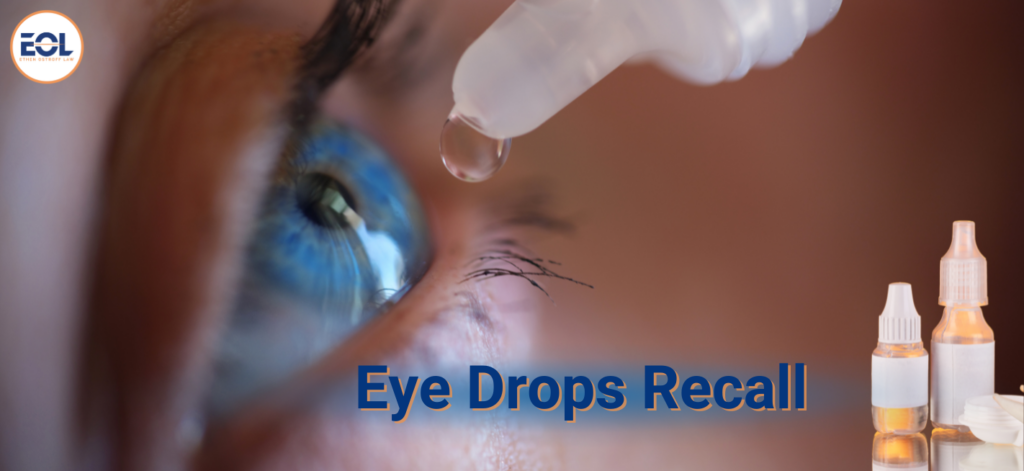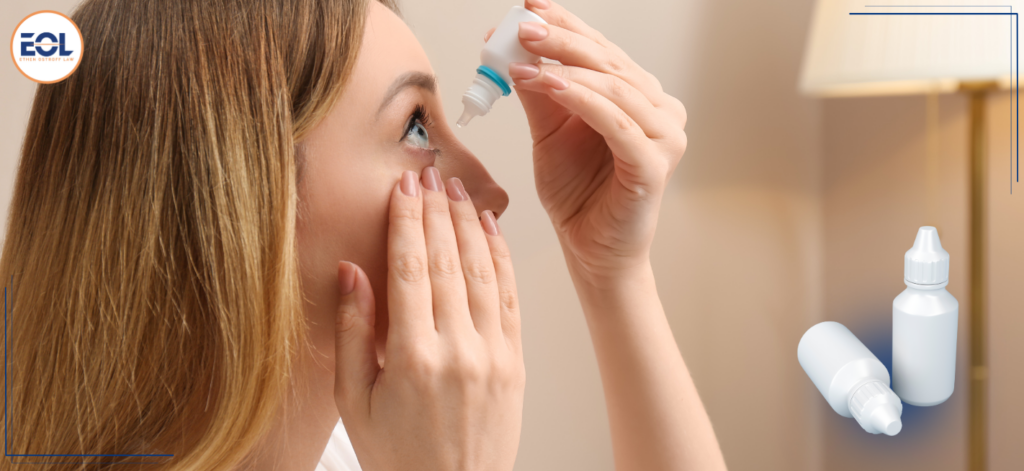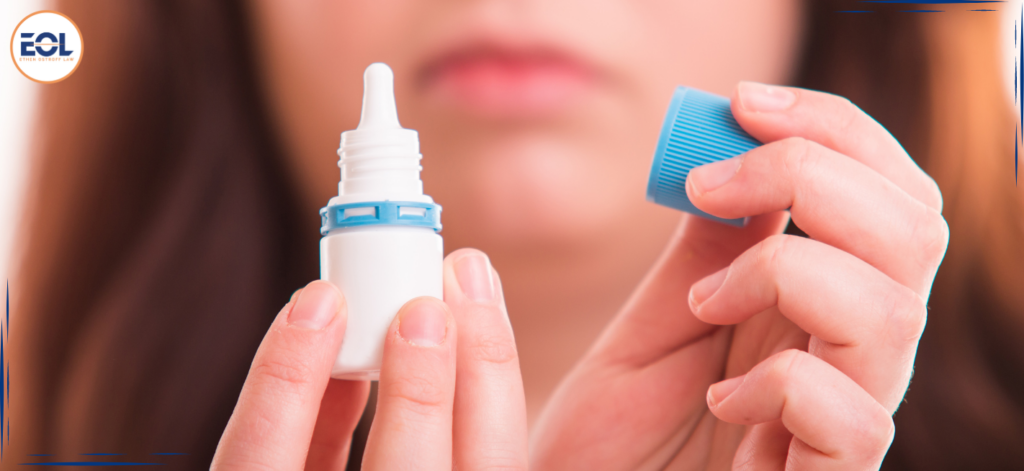Eye Drops Recall in 2024: Protecting Your Vision
Four eye ointments have recently been recalled by the U.S. Food and Drug Administration (FDA) due to concerns regarding sterility assurance at an Indian manufacturing facility. Brands affected by the eye drops recall are Equate, CVS Health, and AACE Pharmaceuticals. While there have been no reported adverse effects, it’s crucial to stay vigilant about eye care product safety. At Ethen Ostroff Law, we understand the gravity of this situation and are dedicated to supporting and representing those affected. So, we examine the recall’s specifics, its implications for consumer safety, and steps individuals can take if impacted. We also highlight how our firm can provide legal assistance in such cases.
Eye Ointment Recall in 2024
On February 26, 2024, the FDA issued a recall notice concerning the sterility of eye ointments produced by Brassica Pharma Pvt. Ltd. in India. The recall affects products sold under the Equate, CVS Health, and AACE Pharmaceuticals brands, with expiration dates between April 2024 and September 2025. These items were distributed nationwide through retailers like Walmart and CVS.
The recalled eye drops are:
- CVS Health Lubricant Eye Ointment in a 3.5-gram tube with UPC: 050428634141.
- Equate Lubricant Eye Ointment in a 3.5-gram tube with UPC: 681131395298.
- Equate Stye Lubricant Eye Ointment in a 3.5-gram tube with UPC: 681131395304.
- Lubricant PM Ointment by AACE Pharmaceuticals in a 3.5-gram tube with UPC: 371406124356.
In January 2024, the FDA also addressed counterfeit eye drops, expressing concerns about potential contamination and infection risks.

Eye Drops Recall in 2023
In October 2023, a notable recall affected 28 eye drop products, raising concerns about potential vision loss. Despite no reported injuries, the importance of product safety remains paramount.
The list of recalled eye drops in 2023 includes:
- Brimonidine Tartrate Ophthalmic Solution, 0.15%, NDC numbers 60505-0564-1, 60505-0564-2 and 60505-0564-3.
- Clear Eyes Once Daily, Eye Allergy Itch Relief: Lot 114349, Lot 117396, Lot 0120128, Lot 114371, and Lot 123781.
- CVS Health Lubricant Eye Drops 10 ml (single pack), NDC number 76168-714-10.
- CVS Health Lubricant Eye Drops 10 ml (twin pack), NDC number 76168-714-20.
- CVS Health Lubricant Eye Drops 15 ml (single pack), NDC number 76168-702-15.
- CVS Health Lubricant Eye Drops 15 ml (twin pack), NDC number 76168-702-30.
- CVS Health Lubricant Gel Drops 15 ml (single pack), NDC number 76168-704-15.
- CVS Health Lubricant Gel Drops 15 ml (twin pack), NDC number 76168-704-30.
- CVS Health Lubricating Gel drops 10 ml, NDC number 76168-712-10.
- CVS Health Mild Moderate Lubricating Eye Drops 15 ml (single pack), NDC number 76168-711-15.
- CVS Health Multi-Action Relief Drops 15 ml, NDC number 76168-706-15.
- Delsam Pharma Artificial Eye Ointment, NDC 72570-122-35 and UPC 3 72570 12235 3.
- Delsam Pharma Artificial Tears Lubricant Eye Drops, NDC 72570-121-15 and UPC 3 72570 12115 8.
- Berne’s MSM Drops 5% Solution, Lot# 6786.
- EzriCare Artificial Tears Lubricant Eye Drops, NDC 79503-0101-15 and UPC 3 79503 10115 7.
- Leader Dry Eye Relief 10 ml, NDC number 70000-0088-1.
- Leader Dry Eye Relief 15 ml, NDC number 70000-0089-1.
- Leader Eye Irritation Relief 15 ml, NDC number 70000-0087-1.
- Leader Lubricant Eye Drops 15 ml (single pack), NDC number 70000-0090-1.
- Leader Lubricant Eye Drops 15 ml (twin pack), NDC numbers 70000-0090-2 (carton) and 70000-0090-1 (bottle).
- LightEyez MSM Eye Drops-Eye Repair, NDC number not provided.
- Purely Soothing 15% MSM Drops, LOT#: 2203PS01, UPC 7 31034 91379 9; and LOT#: 1808051, UPC 7 31034 91382 9.
- Rite Aid Gentle Lubricant Gel Eye Drops 15 ml, NDC number not provided.
- Rite Aid Lubricant Eye Drops 10 ml (twin pack), NDC number 11822-4811-3.
- Rite Aid Lubricant Eye Drops 15 ml (twin pack), NDC number 11822-9707-5.
- Rite Aid Lubricant Gel Drops 15 ml, NDC number 11822-9706-5.
- Rite Aid Lubricating Gel Drops 10 ml, NDC number 11822-4540-3.
- Rite Aid Multi-Action Relief Drops 15 ml, NDC number 11822-2254-3.
- Rugby Lubricating Tears Eye Drops 15 ml, NDC number 0536-1282-94.
- Rugby Polyvinyl Alcohol 1.4% Lubricating Eye Drops 15 ml, NDC number 0536-1325-94.
- Target Up&Up Dry Eye Relief 15 ml, NDC number 76168-800-30.
- Target Up&Up High-Performance Lubricant Eye Drops 15 ml (single pack), NDC number 11673-522-15.
- Target Up&Up High-Performance Lubricant Eye Drops 15 ml, NDC number 11673-522-30.
- Velocity Pharma LLC Lubricant Eye Drop 10 ml (triple pack), NDC number 76168-502-30.
- Walmart Equate Hydration PF Lubricant Eye Drop 10 ml, NDC number 79903-168-01.
Please note that this list may be updated as new information becomes available.
Potential Risks and Consumer Guidance
Brassica Pharma has promptly notified distributors and retailers about the recalled eye ointments, stressing the importance of removing them from shelves. Consumers can either discard them safely or return them to the point of purchase. Additionally, individuals experiencing any symptoms potentially linked to the recalled eye ointments should seek medical attention promptly.
The FDA recommends consumers stop using the recalled eye ointments immediately. It’s crucial to be aware of the potential risks associated with contaminated eye products.
Look out for signs like:
- Blurry vision.
- Burning sensation.
- Discharge from the eye (yellow, green, or clear).
- Eye or eyelid redness.
- Eye pain or discomfort.
- Eyelid or eye swelling.
- Eyes sticking shut upon waking.
- Feeling of a foreign body in the eye.
- Itching.
- Sensitivity to light.
Ensuring Future Vision Safety
Your vision deserves the best protection, so make informed choices when selecting eye drops and lubricants. To safeguard your eye health, take these proactive measures when purchasing eye products:
- Choose trusted brands: Opt for reputable, well-established brands known for quality and safety standards, minimizing potential issues.
- Inspect for warning signs: Before purchase, carefully examine eye drops and lubricants for any unusual odor, particles, or signs of tampering. Ensure that the packaging is sealed and check the expiration date.
- Stay informed about FDA recalls: Regularly consult the FDA’s recall lists to stay updated on any potential risks associated with eye products.

Verifying Eye Drops for Recalls
Ensuring the safety of your eye drops begins with a simple check. Follow these steps to verify the safety of your eye drops and maintain your eye health effectively:
- Visit the FDA‘s recalled eye drops list: Begin by accessing the FDA’s official list of recalled eye drops. This resource provides up-to-date information on any recalls affecting eye drop products.
- Check product names and brands: Scan the list for the names and brands of your eye drops. Recent recalls have involved products from companies like Brassica Pharma.
- Confirm the product’s absence from the recall list: If your eye drops are not listed among the recalled products, they are likely not affected by any known safety concerns. This confirmation provides reassurance regarding the safety of your eye drops.
- Verify the expiration dates: Even if your eye drops are not subject to a recall, it’s essential to verify their expiration dates regularly. Expired products may lose efficacy or pose potential risks to eye health.
- Dispose of expired products: Promptly discard any expired eye drops to prevent inadvertent use. Proper disposal ensures that you maintain optimal eye care and minimize potential health risks.
Disposing of Eye Drops Properly
To dispose of eye drops properly, you can follow these steps:
- Local drug collection or trash: Take expired or unwanted eye drops to a local drug collection box or dispose of them in the trash.
- Mix with unwanted material: At home, mix the eye drops with unwanted material like coffee grounds or kitty litter to deter children and pets.
- Seal and discard: Put the mixture in a sealable plastic bag or container to prevent leaks, then discard it in the trash, away from children and pets.
Check the expiration date and remove personal information from the container before disposal to protect your identity.
Process for Reporting Eye Drops Issues
Reporting an issue with eye drops is crucial for product safety. By following these steps, you can help ensure product safety and prevent others from experiencing similar issues with the same eye drops:
- Document symptoms: Note any adverse effects like redness, irritation, or vision changes. Record the date, time, and relevant details.
- Contact your healthcare provider: Seek medical attention promptly. Discuss symptoms with your healthcare provider and follow their advice on using eye drops.
- Report to the FDA: Submit a report to the FDA’s MedWatch Adverse Event Reporting program online or by phone at 1-800-FDA-1088. Provide detailed information about your symptoms and the eye drops you used.
- Contact manufacturer: Reach out to the eye drop manufacturer to report the issue. Provide detailed information about your experience.
- Keep records: Keep copies of all communication, receipts, and documentation related to the issue for future reference.
- Follow-up: Follow up with the FDA and the manufacturer if you don’t receive a response. Persistence may be needed to ensure your report is properly addressed.
Essential Details for Reporting Eye Drop Problems
When reporting a problem with eye drops, provide the following information:
- Brand and product name: Specify the brand and exact product you’re reporting.
- Contact information: Include your name, phone number, and email for further communication.
- Date of purchase: Provide the purchase date for potential recalls or investigations.
- Medical history: Mention relevant medical history, like allergies or past eye conditions.
- Problem description: Clearly explain the issue, such as side effects or contamination.
- Prescription details: If prescribed, include the prescriber’s name and prescription information.
Report to the FDA’s MedWatch Adverse Event Reporting program or contact the manufacturer directly.

Legal Recourse and Support
If you suffered adverse effects from contaminated eye drops, like eye infections or vision-related injuries, you may seek compensation through various legal avenues:
- Class action lawsuits: Multiple affected individuals can join forces in a class action lawsuit against the responsible parties.
- Insurance claims: Depending on the situation, individuals might file insurance claims for medical expenses or pursue liability coverage for legal claims.
- Product liability lawsuits: If the eye drops were defective or contaminated, a lawsuit can target the manufacturer, distributor, or retailer, alleging negligence, strict liability, or breach of warranty.
- Regulatory action: Government agencies like the FDA may take enforcement actions, such as fines or sanctions, against companies violating safety standards.
Contaminated Eye Drops Lawsuits
The discovery of harmful bacteria in various eye drop brands and artificial tears has sparked concerns about consumer safety. Lawsuits against manufacturers are underway, focusing on individuals who suffered injuries or eye infections from using recalled and contaminated drops.
Injuries linked to these lawsuits include:
- Eye infections.
- Severe bacterial infections.
- Vision loss.
- Other vision-related complications.
Companies involved in these lawsuits include:
- Amazon.com, Inc.
- Cardinal Health, Inc.
- CVS Health Corporation
- Delsam Pharma LLC
- EzriCare, LLC
- Global Pharma Healthcare Private Limited
- Harvard Drug Group, LLC
- RiteAid Corporation
- Target Corporation
- Velocity Pharma LLC
- Walmart Inc.
Claims in Contaminated Eye Drops Lawsuits
Allegations in lawsuits regarding contaminated eye drops against manufacturers and distributors include:
- Breach of contract: Selling of products unfit for their intended use.
- Breach of warranty: Selling of products that do not meet their intended purpose.
- Fraud: Manufacturers and distributors made false safety claims.
- Negligence: Negligence in production and distribution led to contamination.
- Product liability: Allegations of liability for injuries caused by contaminated eye drops under product liability laws.
- Punitive damages: To penalize manufacturers and distributors for alleged misconduct.
- Strict liability: Strict liability for injuries from manufacturing defects in products.
Compensation for Eye Injuries
You may qualify for the following compensation if affected by contaminated eye drops:
- Lost income.
- Medical expenses.
- Physical pain and emotional distress.
- Punitive damages.
How an Eye Drops Recall Attorney Can Assist You
Attorneys specializing in eye drop recalls can provide invaluable assistance. Here’s how:
- Clear legal guidance, empowering you to make informed decisions.
- Emotional support throughout the process.
- Extensive knowledge of product liability laws, enabling them to develop a strong legal strategy.
- If negotiations fail, your eye drops recall attorney will represent you in court, advocating for your rights.
- They engage with manufacturers, distributors, and insurers to secure a fair settlement.
- Attorneys gather evidence to strengthen your case, including manufacturing records and testing data.
Ethen Ostroff Law: Your Lawyer for Eye Drops Recall
In light of the recent eye ointment recall, safeguarding your vision is paramount. If you’ve been affected, seek legal support from Ethen Ostroff Law. Trust us to navigate the complexities of personal injury cases and protect your rights throughout the recall and claims process. Your vision matters; let a lawyer for eye drops recall from our firm safeguard it.


